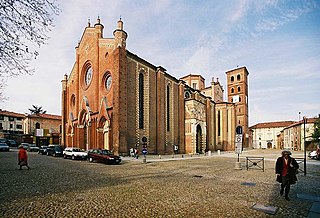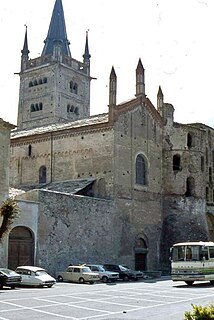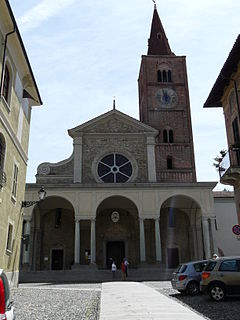Related Research Articles

Federico Sclopis di Salerano was an Italian statesman and jurist, best remembered for his role in the unification of Italy and his adjudication in the Alabama claims.

Pinerolo is a town and comune in the Metropolitan City of Turin, Piedmont, northwestern Italy, 50 kilometres (31 mi) southwest of Turin on the river Chisone. The Lemina torrent has its source at the boundary between Pinerolo and San Pietro Val di Lemina.

Chieri is a town and comune in the Metropolitan City of Turin, Piedmont (Italy), located about 11 kilometres southeast of Turin, 15 km (9 mi) by rail and 13 km (8 mi) by road. It borders the following municipalities: Baldissero Torinese, Pavarolo, Montaldo Torinese, Pino Torinese, Arignano, Andezeno, Pecetto Torinese, Riva presso Chieri, Cambiano, Santena, Poirino.

The Roman Catholic Diocese of Pinerolo is a Latin rite bishopric in the administrative province of Turin of Piedmont region, Northwestern Italy. It is a suffragan of the Metropolitan archbishopric of Turin.

The Roman Catholic Archdiocese of Turin is an ecclesiastical territory or diocese of the Roman Catholic Church in Italy.

The Italian Roman Catholic Diocese of Cuneo was created in 1817, from territory that previously had belonged to the Diocese of Mondovì. It is suffragan of the Archdiocese of Turin. The first bishop of Cuneo was Amadeo Bruno di Samone.
Ulric Manfred II or Manfred Ulric was the count of Turin and marquis of Susa in the early 11th century. He was the last male margrave from the Arduinid dynasty. Ulric Manfred's daughter, Adelaide, inherited the majority of his property. Through marriage to Adelaide (c.1045), Otto of Savoy, a younger son of Count Humbert I of Savoy became margrave of Turin. Their descendants would later comprise the House of Savoy who ruled Sardinia and Italy.

Adelaide of Turin was the countess of part of the March of Ivrea and the marchioness of Turin in Northwestern Italy from 1034 to her death. She was the last of the Arduinici. She is sometimes compared to her second cousin, and close contemporary, Matilda of Tuscany.

The Diocese of Asti is a Roman Catholic ecclesiastical territory in Piedmont, northern Italy, centered in the city of Asti. It has been a suffragan of the Archdiocese of Turin since 1515. Previous to that, it was a suffragan of the Archdiocese of Milan.

The Roman Catholic Diocese of Mondovì is a Catholic diocese in the Ecclesiastical Region of Piedmont in Italy. Its 192 parishes are divided between the Province of Savona in the (civil) region Liguria and the Province of Cuneo in the (civil) region Piedmont. The diocese is a suffragan of the Archdiocese of Turin.

The Diocese of Tortona is a Roman Catholic ecclesiastical territory in northern Italy, spanning parts of three regions of Piedmont, Lombardy and Liguria. It is a suffragan of the Archdiocese of Genoa and forms part of the ecclesiastical region of Liguria. The diocese claims to be one of the oldest in Lombardy and the Piedmont.

The Roman Catholic diocese of Bobbio was an Italian bishopric which existed from 1014 until 1986. The diocese was formed from the territory of the Abbey of Bobbio.

The Italian Catholic Diocese of Ivrea is in Piedmont. For a time the diocese included the territory which had once been the diocese of Aosta, suppressed in 1803 but restored in 1817. Up until 1517 Ivrea was a suffragan of the Archdiocese of Milan; it is now a suffragan of the Archdiocese of Turin.

The Roman Catholic Diocese of Susa, in Piedmont (Italy), was established in 1772. It is a suffragan of the archdiocese of Turin. The diocese and the city of Susa lie on the main route that leads to Italy from the Mont Cenis Pass and the Col de Montgenèvre.

The Roman Catholic Diocese of Acqui straddles the (civil) regions of Piedmont and Liguria, in northwest Italy. The ancient Roman name of the place was Aquae Statiellae, which was sometimes confused with Aquae Sentiae (Aix-en-Provence), and Aquae Augustae (Dax), where there were also bishops. Acqui had always been subordinate to the Province of Milan, down until 1817, when Pope Pius VII assigned it to the Province of Turin. As a suffragan of the Archdiocese of Turin, it falls within the ecclesiastical region of Piedmont.

Giovanni Battista Crosato was an Italian painter of quadratura, active in the 18th century in Piedmont.
Landulf of Turin was an Italian bishop. He was bishop of Turin from 1011 until his death in 1037.
Amizo of Turin was an Italian bishop. He was bishop of Turin from 966 until his death in 1000. Based on an early modern Milanese chronicle, it is sometimes argued that Amizo was the son of Arduin Glaber of Turin.
Gezo of Turin was an Italian bishop. He was bishop of Turin from 1000 until his death in 1011.
Vitelmo of Turin or William of Turin was an Italian bishop. He was bishop of Turin from c.1082 until his death in 1092.
References
- F. Savio, Gli antichi vescovi d’Italia. Il Piemonte (Turin, 1899), pp. 335–339.
- T. Rossi and F. Gabotto, Storia di Torino, vol. 1: fino al 1280 (Turin, 1914), pp. 92ff.